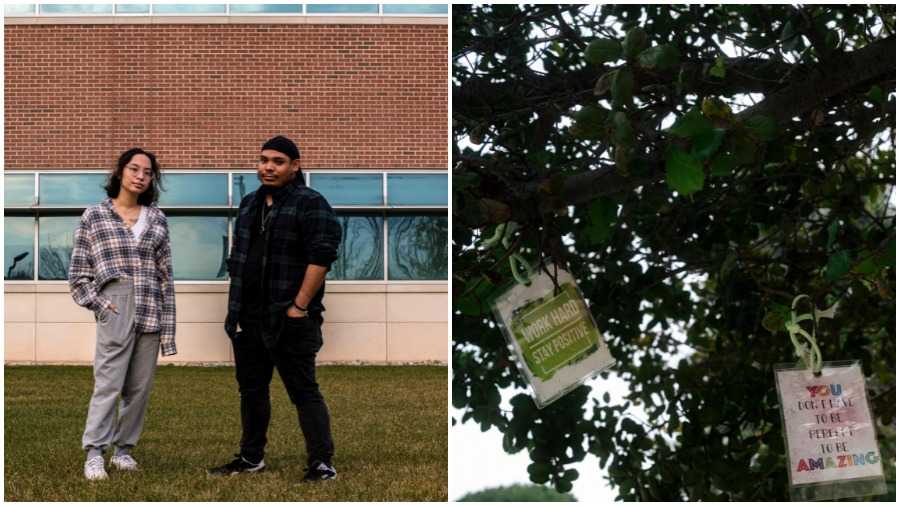The mood was already strained at West Virginia University, US, as students hunkered down for finals in December. Then an employee found an anonymous letter in a men’s bathroom, embellished with illustrations and poetry, that threatened suicide in or around the student union at noon Monday, December 6.
Still reeling from a very public suicide of a 20-year-old business major in April, the university administration reacted swiftly. Officials posted a warning on the university’s website, pleading with the letter’s author to seek help and asking students to be alert to their surroundings. “While we do not know your personal circumstances, we do know this is a very stressful time of year,” the university wrote, adding, “You are not alone.”
As Monday came and went without incident, students and university officials expressed relief but worried that the note was just one indicator of the fragile mental health of many students during the turmoil of the coronavirus pandemic.
Colleges across the US are facing a mental health crisis, driven in part by the pandemic. After almost two years of remote schooling, restricted gatherings and constant testing, many students are anxious, socially isolated, depressed — and overwhelming mental health centres. At a few institutions, there has been a troubling spate of suicides.
Now another swell of Covid-19 cases, driven by the omicron variant, threatens to make life worse. A big question is what campus life will look like in January. Will classes be remote? Will students be able to gather? Will there even be campus life?
Loneliness or isolation, along with loss of motivation or focus, are among the top concerns of college students who have sought counselling during the pandemic, according to data collected by the Center for Collegiate Mental Health at Pennsylvania State University, US. Some administrators worry that there is a conflict between protecting students’ physical health and their mental health.
“Restricting the ability to interact, there’s a price to pay for all that,” said Eli Capilouto, president of the University of Kentucky, US. “Somebody said if we’re not careful, we’re going to trade one epidemic for another, and in many ways I think we are.”
Over the past decade, the rate of depression, anxiety and serious thoughts of suicide has doubled among college students, according to Daniel Eisenberg, a professor at UCLA [University of California, Los Angeles] and a principal investigator of the Healthy Minds Study, an annual survey of thousands of students. And the pandemic has only intensified those trends.
It is unclear whether the number of suicides is going up. But Colleen Wamback, a spokesperson for Worcester Polytechnic, US, said the toll there had been “unprecedented”. The school had two suicides from 2006 to June 2021, she said. In the past six months, there have been four deaths, two of them confirmed suicides and two others still under investigation.
There have been at least two suicides connected with West Virginia University since the pandemic began. Eric Domanico, a freshman there, died by suicide in July 2020, soon after students were sent home in the first wave of the pandemic. Eric was already emotionally fragile, his father, Frank Domanico, said. Remote learning was a “disaster”, and he missed his friends at school. “My son died of loneliness,” Domanico said.
In a poignant forecast of the perils of isolation, The Yale Daily News interviewed Rachael Shaw-Rosenbaum, a first-year student from Anchorage, Alaska, in the fall of 2020 as she moved into her dormitory room alone — because of Covid-19 restrictions — and went into preemptive quarantine. She was not afraid of Covid-19, Shaw-Rosenbaum told the paper; she was afraid for her mental health. “So I moved myself in for a couple of hours, and cried,” she said.
In March, before she could finish her first year, she died by suicide in her dormitory room.
Bergen Community College, in suburban New Jersey, US, lost a student to suicide this semester, and demand for therapy has “exploded”, said Jennifer Migliorino-Reyes, the dean for student support.
Cassie Guinto, a second-year student there, offered tutoring services this semester to first-year students. But she noticed that many students who sought academic help did not need it. “They needed to talk,” she said.
More than 9,000 people signed a petition asking for more mental health services at Saint Louis University, US. The student government at West Virginia University is asking for state aid. The Domanico family has started a foundation in Eric’s memory.
At Yale, alumni, family and friends of Shaw-Rosenbaum founded Elis for Rachael, trying to influence the university’s mental health policies. The pandemic pushed her over the edge, her mother, Pamela Shaw, said in a phone call from Anchorage. She had tried to convince her daughter to take a gap year until the pandemic receded. “This is not what college is like,” she told her. But Rachael, she said, could not see that “this is just a blip in time.”
NYTNS











